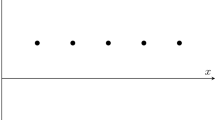Abstract
Overskeid (1993) argues that the radical behaviorist account of inner events is inadequate. He recommends an alternative approach which explicitly acknowledges the causal role of inner events. This approach supposedly increases the predictive and controlling power of our treatment and also contributes to theoretical consistency. In this paper, it is argued that Overskeid’s alternative approach is based on a mistake. Although accepting the causal role of inner events indeed contributes to theoretical consistency, it does not increase the predictive and controlling power of the treatment.
Similar content being viewed by others
References
BYRNE, J. H. (1987). Cellular analysis of associative learning. Physiological Reviews, 67, 329–439.
CATANIA, A. C. (1988). Problems of selection and phylogeny, terms and methods of behaviorism. In A. C. Catania & S. Harnad (Eds.), The selection of behavior (pp. 474–483). Cambridge, England: Cambridge University Press.
DUDAI, Y. (1989). Neurobiology of memory. Oxford: Oxford University Press.
HAWKINS, R. D., & KANDEL, E. R. (1984). Is there a cell-biological alphabet for simple forms of learning? Psychological Review, 91, 375–391.
OVERSKEID, G. (1994). Private events and other causes of behavior: Who can tell the difference. The Psychological Record, 44, 35–43.
QUINE, W. V. (1960). Word and object Cambridge, MA: Mit Press.
QUINE, W. V. (1974). The roots of reference. La Salle, IL: Open Court.
QUINE, W. V. (1985). States of mind. Journal of Philosophy, 83, 5–8.
SKINNER, B. F. (1953). Science and human behavior. New York: Macmillan.
SKINNER, B. F. (1957). Verbal behavior. New York: Appleton-Century-Crofts.
SKINNER, B. F. (1974). About behaviorism. New York: Knopf.
STEMMER, N. (1971). Three problems in induction. Synthese, 23, 287–308.
STEMMER, N. (1983). The roots of knowledge. New York: St. Martin’s Press (Oxford: Blackwell).
STEMMER, N. (1992a). Skinner and a solution to the problem of inner states. The Behavior Analyst, 15, 115–128.
STEMMER, N. (1992b). The behavior of the listener, generic extension, and the communicative adequacy of verbal behavior. The Analysis of Verbal Behavior, 10, 69–80.
STEMMER, N. (1993). Behavioral materialism, the success of folk psychology, and the ambiguous first-person case. Behavior and Philosophy. 21, 1–14.
Author information
Authors and Affiliations
Rights and permissions
About this article
Cite this article
Stemmer, N. Explanatory and Predictive Roles of Inner Causes: A Reply to Overskeid. Psychol Rec 45, 349–354 (1995). https://doi.org/10.1007/BF03395147
Published:
Issue Date:
DOI: https://doi.org/10.1007/BF03395147




